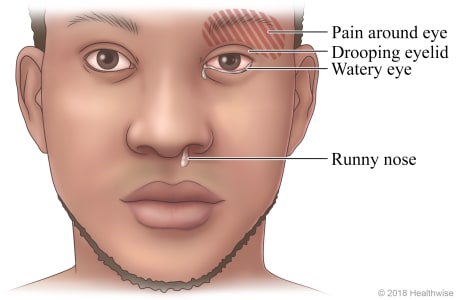Cluster Headache
Cluster headaches are recurring headaches that occur in groups or cycles. The headaches appear suddenly and cause severe, debilitating pain on one side of the head, along with a watery eye and nasal congestion on the affected side of the head.
The cause of cluster headaches is unknown. Although there is no cure for cluster headaches, medicines can reduce the frequency and duration of the painful headaches.
Symptoms
Symptoms of cluster headaches

Symptoms of cluster headaches often include severe pain around one eye, a runny nose, a watery eye, and a drooping eyelid, all on the affected side of the head.
Causes
What causes cluster headaches?
Experts aren't sure what causes cluster headaches. They run in families, but it's not clear why some people get cluster headaches and others don't.
Pevention
How are cluster headaches prevented?
There is no cure for cluster headaches. You can't do anything to prevent a cycle of cluster headaches from starting.
But as soon as a cycle starts, you can take medicine that may help prevent more headaches or reduce how many you have during a cycle. You take this medicine every day during the cycle.
Certain things may be more likely to cause a headache during a cycle. These are called triggers. Avoiding them may help prevent headaches. Triggers include:
- Drinking alcohol.
- Sleep problems. Try to go to bed and wake up at the same time every day. Don't take naps.
- Increases in body temperature. This can happen when you exercise, take a hot bath, or get angry.
- Nitrates. These are found in wine, cured meats, aged cheeses, and some medicines.
- Histamine. Seasonal allergies could trigger a headache.
A headache diary can give you and your doctor clues to help you manage your headaches. Write down when and how often the headaches happen, how severe they are, and what you think may be causing them. Share this with your doctor.
Diagnosis
How are cluster headaches diagnosed?
A doctor can usually tell if you have cluster headaches by asking about your symptoms and examining you. Your doctor may order other tests, such as a CT scan or an MRI, if the doctor thinks your symptoms may be caused by another disease.
Treatment
How are cluster headaches treated during a cycle?
When a headache starts, you can take medicine or breathe in oxygen from a machine to ease the pain or stop the headache. You use these treatments only when you feel a headache coming on.
When a cluster headache begins:
- Start your treatment right away. Don't wait for the headache to get worse. Take your medicine exactly as planned with your doctor.
- Do what feels best. You may feel better if you walk, jog in place, sit, kneel, or stand. Lying down may make the pain worse.
If your treatment doesn't work, ask your doctor if you can try something else. It may take time to find what works best for you.
Over-the-counter pain medicines, such as aspirin, acetaminophen, and ibuprofen, usually don't work for cluster headaches.
Dealing with repeated cluster headaches can lead to stress, which in turn can continue the headache cycle. Finding ways to cope with stress (such as being active regularly) may reduce the severity or frequency of your cluster headaches.
When to Call
Cluster headache: When to call
Call911anytime you think you may need emergency care. For example, call if:
- You have symptoms of a stroke. These may include:
- Sudden numbness, tingling, weakness, or loss of movement in your face, arm, or leg, especially on only one side of your body.
- Sudden vision changes.
- Sudden trouble speaking.
- Sudden confusion or trouble understanding simple statements.
- Sudden problems with walking or balance.
- A sudden, severe headache that is different from past headaches.
Call your doctor nowor seek immediate medical care if:
- You have a fever with a stiff neck or a severe headache.
- You feel very sleepy or confused.
- You have new nausea and vomiting, and you cannot keep down food or liquids.
Watch closely for changes in your health, and be sure to contact your doctor if:
- You have a headache that does not get better within 1 or 2 days.
- Your headaches get worse or happen more often.
- You are sensitive to light.
Self-Care
How can you care for yourself when you have cluster headaches?
- Start your treatment right away. Do not wait for the headache to get worse. If your doctor prescribed at-home oxygen therapy to stop a cluster headache, follow the directions for using it.
- Be safe with medicines. Take your medicines exactly as prescribed. Call your doctor if you think you are having a problem with your medicine. You will get more details on the specific medicines your doctor prescribes.
- If your doctor recommends it, take an over-the-counter pain medicine, such as acetaminophen (Tylenol), ibuprofen (Advil, Motrin), or naproxen (Aleve). Read and follow all instructions on the label.
- Do not take two or more pain medicines at the same time unless the doctor told you to. Many pain medicines have acetaminophen, which is Tylenol. Too much acetaminophen (Tylenol) can be harmful.
- Carry medicine with you to quickly treat a headache.
- Put ice or a cold pack on the area for 10 to 20 minutes at a time. Put a thin cloth between the ice and your skin.
Copyrighted material adapted with permission from Healthwise, Incorporated. This information does not replace the advice of a doctor.
